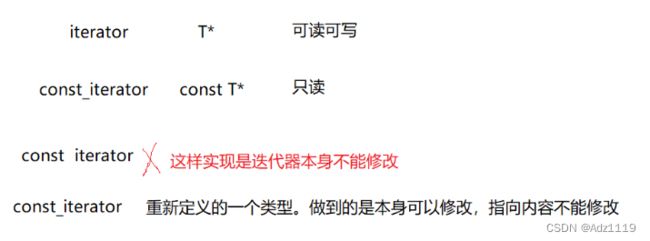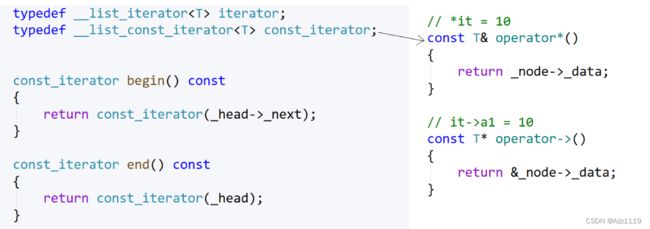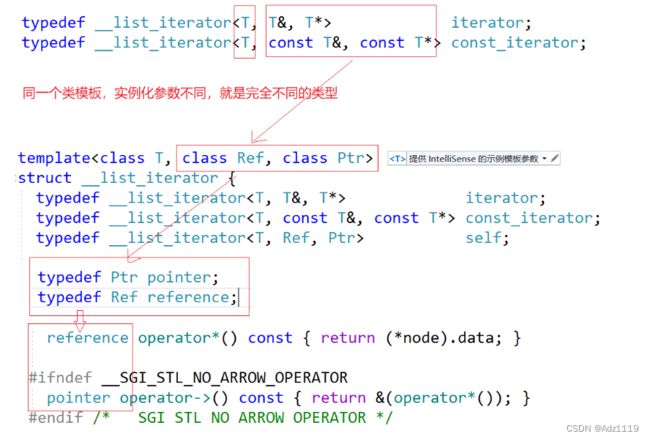- VMware Centos8突然上不了网,`Could not resolve host: mirrorlist.centos.org` 错误
kewen_123
linux运维服务器
VMwareCentos8突然上不了网,疑似是强制关机导致的#重启网络连接nmclinetworkingon#查看网卡ipnmclideviceshow
- 【Linux网络编程】socket套接字的基础API接口
清水加冰
linux网络
目录前言1.网络字节序2.socket编程接口2.1socket2.2bind2.3地址转换函数2.4recvfrom2.5sendto2.6TCPsocketAPI2.6.1listen()2.6.2accept()2.6.3close()2.6.4connect()总结前言了解了计算机网络的基础知识,想要快速上手网络编程,那就很有必要了解一下网络套接字相关的接口;本文主要介绍一些socket编
- C/C++程序员应聘常见面试题深入剖析
xjbclz
C/C++
1.引言本文的写作目的并不在于提供C/C++程序员求职面试指导,而旨在从技术上分析面试题的内涵。文中的大多数面试题来自各大论坛,部分试题解答也参考了网友的意见。许多面试题看似简单,却需要深厚的基本功才能给出完美的解答。企业要求面试者写一个最简单的strcpy函数都可看出面试者在技术上究竟达到了怎样的程度,我们能真正写好一个strcpy函数吗?我们都觉得自己能,可是我们写出的strcpy很可能只能拿
- vue写数字翻牌效果_封装vue版数字翻牌器
咸鱼cc
vue写数字翻牌效果
{{item2}}js部分exportdefault{props:{number:Number},data(){return{list:[],numList:[0,1,2,3,4,5,6,7,8,9,0,1,2,3,4,5,6,7,8,9,'.']}},mounted(){this.scroll();},methods:{scroll(){this.list=this.number.toStrin
- Linux编写C++程序
不爱菠萝的菠萝君
linuxc++
1、安装gcc、g++编译器1.切换root用户suroot然后输入密码2.输入命令yuminstallgccyuminstallg++3.通过查找路径来检查安装是否完成whichgccwhichg++2.编写代码1.打开linux自带的文本编辑器(这样方便一点),比在终端操作简单一些。2编写好c++代码。修改为cpp后缀的文件并保存。如果编写c语言,后缀名为c3.记下文件路径。3.编译文件1.打
- 硬核 | 学习 Linux/C/C++ 必备!
我不是程序员~~~~
C&C++
大家好,我是亮哥!自从做公众号以来,我的公众号关注列表就急速上涨。刚看了一下目前总共几百个了。我从中挑选了几个Linux/C/C++方向上质量不错的号,在此推荐给大家。开发内功修炼公众号「开发内功修炼」号主飞哥有腾讯、搜狗等厂十余年工作经验。他在公众号上持续输出对网络、内存、磁盘的深刻的理解。他还自己写了一本硬核的pdf电子书《理解了实现再谈网络性能》,关注公众号后回复“内功”即可领取。图解|深入
- 【C++】Linux系统编程入门
饮酒吃肉飞奔
Linux/C/C++c++linux开发语言c语言vscodeubuntu
提示:文章写完后,目录可以自动生成,如何生成可参考右边的帮助文档文章目录前言一常用的Linux系统命令符二GCC三静态库四动态库(共享库)动态库五动态库和静态库的区别六Makefile变量模式匹配Makefile的函数七GDB调试设置断点调试命令八文件IO九虚拟地址空间文件描述符opencreatecopylseekstatls-l的实现文件属性操作函数目录操作函数目录遍历函数dupdup2函数f
- 深入理解C++ 线程池:动手实践与源码解析
深度Linux
C/C++全栈开发C/C++线程池Linux开发
在当今多核处理器横行的时代,多任务处理已然成为各类软件提升性能的关键“武器”。想象一下,你正使用一款图片处理软件,它需要同时对多张图片进行滤镜添加、尺寸调整等操作;又或者是一个网络服务器,瞬间要应对来自四面八方的海量用户请求。面对这些场景,如果为每个任务单独创建一个线程,任务结束后再销毁线程,频繁的线程创建与销毁操作,将会带来巨大的开销,就如同让一个短跑运动员不停地进行百米冲刺,很快就会体力不支。
- 高并发环境下的C++ 定时器解决方案
深度Linux
C/C++全栈开发linuxC/C++红黑树定时器
在当今数字化时代,互联网应用如潮水般涌现,高并发场景随处可见。从电商平台的促销抢购,到在线游戏的实时对战,再到金融交易系统的频繁交互,海量的用户请求蜂拥而至,这对系统的性能和响应速度提出了前所未有的挑战。在这些高并发应用的背后,C++定时器扮演着至关重要的角色,它就像一位精准的时间管理者,掌控着任务的执行节奏,确保系统有条不紊地运行。今天,我们就一起来深入探讨高并发环境下的C++定时器解决方案,揭
- 数据结构-顺序表-代码实现(c语言版)
小刘不想改BUG
数据结构基础数据结构c语言算法
使用c语言实现对顺序表的增删改查操作:定义顺序表结构体typedefstruct{int*elements;size_tsize;size_tcapacity;}SequentialList;1.初始化顺序表//初始化顺序表voidSequentialListInit(SequentialList*list,intcapactiy){list->elements=(int*)malloc(size
- std::set、std::map 和 std::unordered_map
-Mr_X-
哈希算法散列表算法
在C++标准库中,std::set、std::map和std::unordered_map是常用的关联容器,但它们在实现方式、性能和应用场景上有显著差异。以下是它们的核心区别:1.数据结构与有序性std::set/std::map基于红黑树(Red-BlackTree)实现,元素(或键值对)严格有序(按升序排列)。std::set:存储唯一键值,仅键可被访问。std::map:存储键值对,键唯一,
- C++的Find算法用法,
-Mr_X-
c++算法
在C++中,可以使用std::map统计值出现次数为2的键。具体步骤如下:遍历std::map,找出所有值为2的键。使用条件语句检查每个值,符合条件时记录对应键。#include#include#includeintmain(){//创建一个std::map并插入数据std::mapdata={{1,2},{2,3},{3,2},{4,1},{5,2}};//用于存储值为2的键std::vecto
- 【MySQL】表数据的CRUD操作详解
可涵不会debug
MySQL数据库mysqlc语言
前言:CRUD操作CRUD:Create(创建),Retrieve(读取),Update(更新),Delete(删除)1.Createinsert插入语法:INSERT[INTO]table_name[(column[,column]...)]VALUES(value_list)[,(value_list)]...value_list:value,[,value]...案例:创建一个学生表CREA
- Haxe:OpenFL框架与Haxe游戏开发_2024-07-15_07-13-55.Tex
chenjj4003
游戏开发2网络游戏引擎c++开发语言深度学习
Haxe:OpenFL框架与Haxe游戏开发Haxe简介Haxe语言概述Haxe是一种开源的、多范式编程语言,它被设计为一种高级语言,用于编写跨平台的应用程序。Haxe的独特之处在于它的编译器,能够将Haxe代码编译成多种目标语言,包括JavaScript、C++、Java、PHP、Python、C#和ActionScript。这种能力使得开发者能够使用相同的代码库为不同的平台生成代码,极大地提高
- QVariantList使用详解
三雷科技
Qt入门windowsqtQVariantList
QVariantList1.基本概念2.使用场景3.基本操作3.1创建和初始化3.2访问元素3.3修改元素3.4删除元素4.实际应用示例5.总结其他QT文章推荐QVariantList是Qt框架中的一个类,用于存储和操作QVariant对象的列表。QVariant是Qt中用于封装各种类型的通用容器类,可以存储基本类型(如int、double、QString等)以及复杂类型(如QList、QMap等
- Rust 循环引用造成的内存泄漏
a457636876
Rust内存泄漏rust
usecrate::List::{Cons,Nil};usestd::cell::RefCell;usestd::rc::Rc;#[derive(Debug)]enumList{Cons(i32,RefCell>),Nil,}implList{fntail(&self)->Option>>{matchself{Cons(_,item)=>Some(item),Nil=>None,}}}fnmain
- Rust语言如何确保内存安全?有哪些内存管理实践?
编程小极客1
rust安全开发语言
Rust语言自诞生以来,就以其独特的内存安全特性而闻名。与C++这类语言相比,Rust在内存管理方面提供了更为严格的保证,使得开发者能够在享受底层语言性能的同时,避免诸如空指针解引用、数据竞态和内存泄漏等常见的内存安全问题。本文将深入探讨Rust语言如何确保内存安全,并介绍一些实用的内存管理实践。一、Rust的内存安全保证Rust的内存安全保证主要源于其所有权系统和生命周期规则。这两个核心概念共同
- python 第三方库 打包 离线电脑安装
新手老张
离线环境安装python
最开始一个个下载第三方库,然后拷贝到离线电脑pip安装,弄好了发现离线电脑系统有问题,重装,,,,前面的又白干了。找了很久,终于找到2022-4月可行且简单的方法:Python第三方库离线安装包制作_Chelseady的博客-CSDN博客_python第三方库的离线安装1.清理python环境:使用piplist命令查看已安装的包;如果有其它的包,则使用pipuninstall[包名]进行删除;2
- Rust入门
三生有杏*
Rustrust
rust入门官网Rust程序设计语言(rust-lang.org)安装官网下载Rustup执行安装VisualStudio,勾选C++桌面开发选项(window环境)helloworld创建项目cargonewhello编译cargobuild执行target/debug目录下hello.exe类型系统概述什么是类型?类型是对二进制数据的一种约束行为.类型比起直接使用二进制数据,有许多优势:少开发
- [C++]使用纯opencv部署yolov12目标检测onnx模型
FL1623863129
深度学习c++opencvYOLO
yolov12官方框架:sunsmarterjie/yolov12【算法介绍】在C++中使用纯OpenCV部署YOLOv12进行目标检测是一项具有挑战性的任务,因为YOLOv12通常是用PyTorch等深度学习框架实现的,而OpenCV本身并不直接支持加载和运行PyTorch模型。然而,你可以通过一些间接的方法来实现这一目标,比如将PyTorch模型转换为ONNX格式,然后使用OpenCV的DNN
- python-leetcode 22.相交链表
SylviaW08
leetcode-pythonleetcode算法职场和发展
题目:给两个单链表的头节点heada和headb,请找出并返回两个单链表相交的起始节点。如果两个链表不存在相较节点,返回null。两个链表在C1开始相交。intersectval:相交的起始节点的值,如果不存在相交节点,这一值为0listA:第一个链表listB:第二个链表skipA:在listA从头节点开始,跳到交叉节点的节点数skipB:在listB从头节点开始跳到交叉节点的节点数方法一:哈希
- 研二自学C++想转码,如何规划才能成功?有什么好的开源项目推荐?
程序员yt
c++开源java
今天给大家分享的是一位粉丝的提问,研二自学C++想转码,如何规划才能成功?有什么好的开源项目推荐?接下来把粉丝的具体提问和我的回复分享给大家,希望也能给一些类似情况的小伙伴一些启发和帮助。同学提问:你好,我想咨询一下转码相关的问题。我的学历背景是安徽大学本科西安电子科技大学研二在读,目前已经完成了C++基本语法的学习,也完成了两个国外的公开课CS144和6.s081的学习与相关lab的编写。接下来
- 0092:小明养猪的故事(C++)
王.Victoria
c++编程语言
小明养猪的故事描述话说现在猪肉价格这么贵,小明也开始了养猪生活。说来也奇怪,他养的猪一出生第二天开始就能每天中午生一只小猪,而且生下来的竟然都是母猪。不过光生小猪也不行,小明采用了一个很奇特的办法来管理他的养猪场:对于每头刚出生的小猪,在它生下第二头小猪后立马被杀掉,卖到超市里。假设在创业的第一天,小明只买了一头刚出生的小猪,请问,在第N天晚上,小明的养猪场里还存有多少头猪?输入测试数据的第一行是
- 华为OD机试 C++ - 区块链文件转储系统
steven_moda
华为OD机试C++华为odc++javajavascriptpython华为OD机试算法
区块链文件转储系统前言:本专栏将持续更新华为OD机试题目,并进行详细的分析与解答,包含完整的代码实现,希望可以帮助到正在努力的你。关于OD机试流程、面经、面试指导等,如有任何疑问,欢迎联系我,wechat:steven_moda;email:
[email protected];备注:CSDN。题目描述区块链底层存储是一个链式文件系统,由顺序的N个文件组成,每个文件的大小不一,依次为F1,F2…F
- 【C++设计模式】迭代器行为模式:原理使用介绍
老猿讲编程
c++设计模式开发语言
1.引言在软件开发领域,设计模式是解决常见问题的有效方案。今天我们要探讨的是一种行为模式——迭代器模式。迭代器模式在实际编程中非常有用,你可能已经在代码里使用过它,只是没有意识到。2.迭代器模式的概念2.1基本思想迭代器模式的核心思想是,当你拥有一个集合(如数组、向量、树状数据结构等)时,你需要一种一致或统一的方式来遍历这个容器结构。对于简单的数组,遍历到下一个元素可能很容易,但对于树状结构,就有
- 【C++】模板进阶:深入解析模板特化
是店小二呀
C++c++开发语言后端
C++语法相关知识点可以通过点击以下链接进行学习一起加油!命名空间缺省参数与函数重载C++相关特性类和对象-上篇类和对象-中篇类和对象-下篇日期类C/C++内存管理模板初阶String使用String模拟实现Vector使用及其模拟实现List使用及其模拟实现容器适配器Stack与QueuePriorityQueue与仿函数本章将深入探讨模板的高级应用,重点解析模板特化的概念和实现方法。个人主页:
- 力扣每日一题【算法学习day.133】
南宫生
算法leetcode学习算法java
前言###我做这类文章一个重要的目的还是记录自己的学习过程,我的解析也不会做的非常详细,只会提供思路和一些关键点,力扣上的大佬们的题解质量是非常非常高滴!!!习题1.设计跳表题目链接:1206.设计跳表-力扣(LeetCode)题面:代码:classSkiplist{int[]arr;publicSkiplist(){arr=newint[20005];}publicbooleansearch(i
- java扑克牌排序_Java 实现斗地主扑克牌排序
2333哒哒哒
java扑克牌排序
packagecom.yu.go;importjava.util.Arrays;importjava.util.Collections;importjava.util.Comparator;importjava.util.HashMap;importjava.util.List;importjava.util.Map;publicclassDay01{privatestaticInteger[]z
- CSE 8B: Introduction to Programming
后端
CSE8B:IntroductiontoProgrammingIIProgrammingAssignment5ObjectsandClassesDue:Monday,February24,11:59PMLearninggoals:●ImplementasimplifiedRedditprogramusingJavaclasses●UsetheJavaArrayListclass●Writeunit
- C++ 设计模式 十一:代理模式 (读书 现代c++设计模式)
Duramentee
代理模式c++设计模式
代理模式文章目录代理模式代理智能指针属性代理虚代理通信代理代理模式的核心结构代理模式的其他变种适用场景优缺点代理今天读第十一种设计模式:代理模式.代理模式通常和装饰器模式一起对比出现,装饰器模式一般适用于为类增添一些额外的功能,而代理模式则是在尽量保持和原类一致的情况下(尽量保留一致的API),为其他对象提供一种代理以控制对这个对象的访问.不过Proxy并不是真正的同质API,因为人们构建的不同种
- 遍历dom 并且存储(将每一层的DOM元素存在数组中)
换个号韩国红果果
JavaScripthtml
数组从0开始!!
var a=[],i=0;
for(var j=0;j<30;j++){
a[j]=[];//数组里套数组,且第i层存储在第a[i]中
}
function walkDOM(n){
do{
if(n.nodeType!==3)//筛选去除#text类型
a[i].push(n);
//con
- Android+Jquery Mobile学习系列(9)-总结和代码分享
白糖_
JQuery Mobile
目录导航
经过一个多月的边学习边练手,学会了Android基于Web开发的毛皮,其实开发过程中用Android原生API不是很多,更多的是HTML/Javascript/Css。
个人觉得基于WebView的Jquery Mobile开发有以下优点:
1、对于刚从Java Web转型过来的同学非常适合,只要懂得HTML开发就可以上手做事。
2、jquerym
- impala参考资料
dayutianfei
impala
记录一些有用的Impala资料
1. 入门资料
>>官网翻译:
http://my.oschina.net/weiqingbin/blog?catalog=423691
2. 实用进阶
>>代码&架构分析:
Impala/Hive现状分析与前景展望:http
- JAVA 静态变量与非静态变量初始化顺序之新解
周凡杨
java静态非静态顺序
今天和同事争论一问题,关于静态变量与非静态变量的初始化顺序,谁先谁后,最终想整理出来!测试代码:
import java.util.Map;
public class T {
public static T t = new T();
private Map map = new HashMap();
public T(){
System.out.println(&quo
- 跳出iframe返回外层页面
g21121
iframe
在web开发过程中难免要用到iframe,但当连接超时或跳转到公共页面时就会出现超时页面显示在iframe中,这时我们就需要跳出这个iframe到达一个公共页面去。
首先跳转到一个中间页,这个页面用于判断是否在iframe中,在页面加载的过程中调用如下代码:
<script type="text/javascript">
//<!--
function
- JAVA多线程监听JMS、MQ队列
510888780
java多线程
背景:消息队列中有非常多的消息需要处理,并且监听器onMessage()方法中的业务逻辑也相对比较复杂,为了加快队列消息的读取、处理速度。可以通过加快读取速度和加快处理速度来考虑。因此从这两个方面都使用多线程来处理。对于消息处理的业务处理逻辑用线程池来做。对于加快消息监听读取速度可以使用1.使用多个监听器监听一个队列;2.使用一个监听器开启多线程监听。
对于上面提到的方法2使用一个监听器开启多线
- 第一个SpringMvc例子
布衣凌宇
spring mvc
第一步:导入需要的包;
第二步:配置web.xml文件
<?xml version="1.0" encoding="UTF-8"?>
<web-app version="2.5"
xmlns="http://java.sun.com/xml/ns/javaee"
xmlns:xsi=
- 我的spring学习笔记15-容器扩展点之PropertyOverrideConfigurer
aijuans
Spring3
PropertyOverrideConfigurer类似于PropertyPlaceholderConfigurer,但是与后者相比,前者对于bean属性可以有缺省值或者根本没有值。也就是说如果properties文件中没有某个bean属性的内容,那么将使用上下文(配置的xml文件)中相应定义的值。如果properties文件中有bean属性的内容,那么就用properties文件中的值来代替上下
- 通过XSD验证XML
antlove
xmlschemaxsdvalidationSchemaFactory
1. XmlValidation.java
package xml.validation;
import java.io.InputStream;
import javax.xml.XMLConstants;
import javax.xml.transform.stream.StreamSource;
import javax.xml.validation.Schem
- 文本流与字符集
百合不是茶
PrintWrite()的使用字符集名字 别名获取
文本数据的输入输出;
输入;数据流,缓冲流
输出;介绍向文本打印格式化的输出PrintWrite();
package 文本流;
import java.io.FileNotFound
- ibatis模糊查询sqlmap-mapping-**.xml配置
bijian1013
ibatis
正常我们写ibatis的sqlmap-mapping-*.xml文件时,传入的参数都用##标识,如下所示:
<resultMap id="personInfo" class="com.bijian.study.dto.PersonDTO">
<res
- java jvm常用命令工具——jdb命令(The Java Debugger)
bijian1013
javajvmjdb
用来对core文件和正在运行的Java进程进行实时地调试,里面包含了丰富的命令帮助您进行调试,它的功能和Sun studio里面所带的dbx非常相似,但 jdb是专门用来针对Java应用程序的。
现在应该说日常的开发中很少用到JDB了,因为现在的IDE已经帮我们封装好了,如使用ECLI
- 【Spring框架二】Spring常用注解之Component、Repository、Service和Controller注解
bit1129
controller
在Spring常用注解第一步部分【Spring框架一】Spring常用注解之Autowired和Resource注解(http://bit1129.iteye.com/blog/2114084)中介绍了Autowired和Resource两个注解的功能,它们用于将依赖根据名称或者类型进行自动的注入,这简化了在XML中,依赖注入部分的XML的编写,但是UserDao和UserService两个bea
- cxf wsdl2java生成代码super出错,构造函数不匹配
bitray
super
由于过去对于soap协议的cxf接触的不是很多,所以遇到了也是迷糊了一会.后来经过查找资料才得以解决. 初始原因一般是由于jaxws2.2规范和jdk6及以上不兼容导致的.所以要强制降为jaxws2.1进行编译生成.我们需要少量的修改:
我们原来的代码
wsdl2java com.test.xxx -client http://.....
修改后的代
- 动态页面正文部分中文乱码排障一例
ronin47
公司网站一部分动态页面,早先使用apache+resin的架构运行,考虑到高并发访问下的响应性能问题,在前不久逐步开始用nginx替换掉了apache。 不过随后发现了一个问题,随意进入某一有分页的网页,第一页是正常的(因为静态化过了);点“下一页”,出来的页面两边正常,中间部分的标题、关键字等也正常,唯独每个标题下的正文无法正常显示。 因为有做过系统调整,所以第一反应就是新上
- java-54- 调整数组顺序使奇数位于偶数前面
bylijinnan
java
import java.util.Arrays;
import java.util.Random;
import ljn.help.Helper;
public class OddBeforeEven {
/**
* Q 54 调整数组顺序使奇数位于偶数前面
* 输入一个整数数组,调整数组中数字的顺序,使得所有奇数位于数组的前半部分,所有偶数位于数组的后半
- 从100PV到1亿级PV网站架构演变
cfyme
网站架构
一个网站就像一个人,存在一个从小到大的过程。养一个网站和养一个人一样,不同时期需要不同的方法,不同的方法下有共同的原则。本文结合我自已14年网站人的经历记录一些架构演变中的体会。 1:积累是必不可少的
架构师不是一天练成的。
1999年,我作了一个个人主页,在学校内的虚拟空间,参加了一次主页大赛,几个DREAMWEAVER的页面,几个TABLE作布局,一个DB连接,几行PHP的代码嵌入在HTM
- [宇宙时代]宇宙时代的GIS是什么?
comsci
Gis
我们都知道一个事实,在行星内部的时候,因为地理信息的坐标都是相对固定的,所以我们获取一组GIS数据之后,就可以存储到硬盘中,长久使用。。。但是,请注意,这种经验在宇宙时代是不能够被继续使用的
宇宙是一个高维时空
- 详解create database命令
czmmiao
database
完整命令
CREATE DATABASE mynewdb USER SYS IDENTIFIED BY sys_password USER SYSTEM IDENTIFIED BY system_password LOGFILE GROUP 1 ('/u01/logs/my/redo01a.log','/u02/logs/m
- 几句不中听却不得不认可的话
datageek
1、人丑就该多读书。
2、你不快乐是因为:你可以像猪一样懒,却无法像只猪一样懒得心安理得。
3、如果你太在意别人的看法,那么你的生活将变成一件裤衩,别人放什么屁,你都得接着。
4、你的问题主要在于:读书不多而买书太多,读书太少又特爱思考,还他妈话痨。
5、与禽兽搏斗的三种结局:(1)、赢了,比禽兽还禽兽。(2)、输了,禽兽不如。(3)、平了,跟禽兽没两样。结论:选择正确的对手很重要。
6
- 1 14:00 PHP中的“syntax error, unexpected T_PAAMAYIM_NEKUDOTAYIM”错误
dcj3sjt126com
PHP
原文地址:http://www.kafka0102.com/2010/08/281.html
因为需要,今天晚些在本机使用PHP做些测试,PHP脚本依赖了一堆我也不清楚做什么用的库。结果一跑起来,就报出类似下面的错误:“Parse error: syntax error, unexpected T_PAAMAYIM_NEKUDOTAYIM in /home/kafka/test/
- xcode6 Auto layout and size classes
dcj3sjt126com
ios
官方GUI
https://developer.apple.com/library/ios/documentation/UserExperience/Conceptual/AutolayoutPG/Introduction/Introduction.html
iOS中使用自动布局(一)
http://www.cocoachina.com/ind
- 通过PreparedStatement批量执行sql语句【sql语句相同,值不同】
梦见x光
sql事务批量执行
比如说:我有一个List需要添加到数据库中,那么我该如何通过PreparedStatement来操作呢?
public void addCustomerByCommit(Connection conn , List<Customer> customerList)
{
String sql = "inseret into customer(id
- 程序员必知必会----linux常用命令之十【系统相关】
hanqunfeng
Linux常用命令
一.linux快捷键
Ctrl+C : 终止当前命令
Ctrl+S : 暂停屏幕输出
Ctrl+Q : 恢复屏幕输出
Ctrl+U : 删除当前行光标前的所有字符
Ctrl+Z : 挂起当前正在执行的进程
Ctrl+L : 清除终端屏幕,相当于clear
二.终端命令
clear : 清除终端屏幕
reset : 重置视窗,当屏幕编码混乱时使用
time com
- NGINX
IXHONG
nginx
pcre 编译安装 nginx
conf/vhost/test.conf
upstream admin {
server 127.0.0.1:8080;
}
server {
listen 80;
&
- 设计模式--工厂模式
kerryg
设计模式
工厂方式模式分为三种:
1、普通工厂模式:建立一个工厂类,对实现了同一个接口的一些类进行实例的创建。
2、多个工厂方法的模式:就是对普通工厂方法模式的改进,在普通工厂方法模式中,如果传递的字符串出错,则不能正确创建对象,而多个工厂方法模式就是提供多个工厂方法,分别创建对象。
3、静态工厂方法模式:就是将上面的多个工厂方法模式里的方法置为静态,
- Spring InitializingBean/init-method和DisposableBean/destroy-method
mx_xiehd
javaspringbeanxml
1.initializingBean/init-method
实现org.springframework.beans.factory.InitializingBean接口允许一个bean在它的所有必须属性被BeanFactory设置后,来执行初始化的工作,InitialzingBean仅仅指定了一个方法。
通常InitializingBean接口的使用是能够被避免的,(不鼓励使用,因为没有必要
- 解决Centos下vim粘贴内容格式混乱问题
qindongliang1922
centosvim
有时候,我们在向vim打开的一个xml,或者任意文件中,拷贝粘贴的代码时,格式莫名其毛的就混乱了,然后自己一个个再重新,把格式排列好,非常耗时,而且很不爽,那么有没有办法避免呢? 答案是肯定的,设置下缩进格式就可以了,非常简单: 在用户的根目录下 直接vi ~/.vimrc文件 然后将set pastetoggle=<F9> 写入这个文件中,保存退出,重新登录,
- netty大并发请求问题
tianzhihehe
netty
多线程并发使用同一个channel
java.nio.BufferOverflowException: null
at java.nio.HeapByteBuffer.put(HeapByteBuffer.java:183) ~[na:1.7.0_60-ea]
at java.nio.ByteBuffer.put(ByteBuffer.java:832) ~[na:1.7.0_60-ea]
- Hadoop NameNode单点问题解决方案之一 AvatarNode
wyz2009107220
NameNode
我们遇到的情况
Hadoop NameNode存在单点问题。这个问题会影响分布式平台24*7运行。先说说我们的情况吧。
我们的团队负责管理一个1200节点的集群(总大小12PB),目前是运行版本为Hadoop 0.20,transaction logs写入一个共享的NFS filer(注:NetApp NFS Filer)。
经常遇到需要中断服务的问题是给hadoop打补丁。 DataNod




